The Truss calamity: 49 deranged days that convulsed Britain
Liz Truss will be remembered for plunging the nation into a catastrophic financial crisis – and being outlived in office by a slowly rotting lettuce. But the most remarkable thing, writes Tom Peck, is that she appears to have absolutely no regrets about the policies that saw her dumped from No 10 in record time

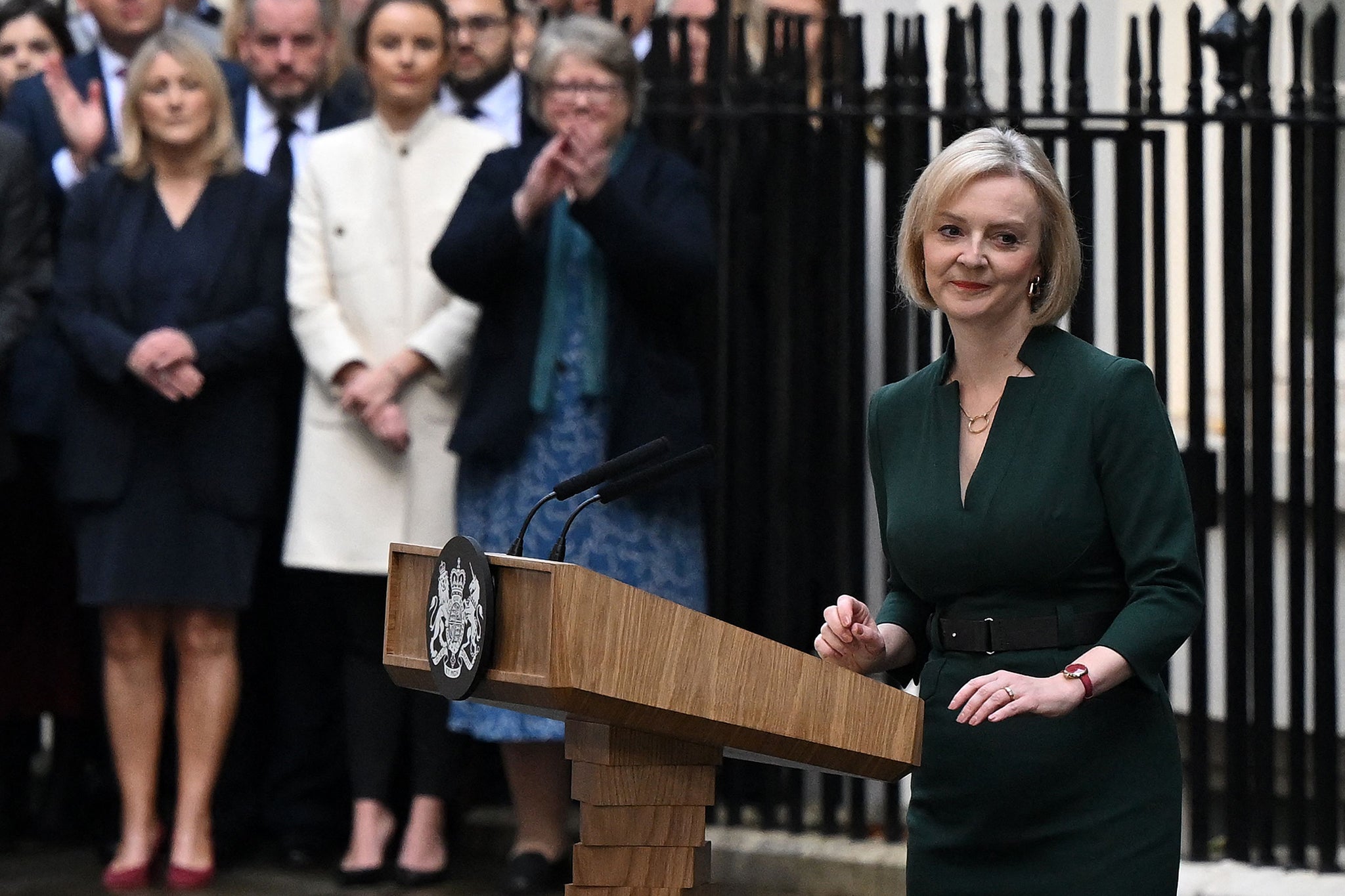
Almost exactly a year ago, outside the Queen Elizabeth II conference centre in Westminster, the anti-Brexit activist Steve Bray pressed stop on his PA system for – thank God – the final time. No one would have to hear his Bay City Rollers pastiche, “Bye Bye Boris”, ever again.
The Tory leadership contest was over. Britain had a new prime minister, who would soon be on her way to Balmoral for her own little conference with the actual, real life, Queen Elizabeth II. It would be Her Majesty’s final such meeting. Her first was with Winston Churchill. Her last was with Liz Truss.
Later that day, Truss would find herself pointlessly driving in circles around central London, hoping for a break in the torrential rain so that she might give a short speech outside 10 Downing Street. The news channels carried rolling pictures of her lectern covered with a bin bag.
The signs were there, and seeing them didn’t require the benefit of hindsight. They were there in foresight as well. A few weeks earlier, Truss had been late for the launch of her own leadership campaign. She could be seen in the hallway outside the small hired room, getting tense with her own TV crew, who had been hired, by her, to film her walking in. The shot, self-evidently, was her main concern. Everybody else could just sit and wait.
And while they did so, they had even longer to pore over the campaign slogan on the wall behind her. “Trusted to deliver”, it said. It was not clear, either before the speech or after, exactly what it was that she was trusted to deliver. She was very proud of being the longest-serving minister in the cabinet, in a country that people felt then, and still feel now, to be suffused with an unmistakeable sense of complete collapse. She had also, now that her career was no longer dependent on David Cameron’s patronage, discovered evangelical Brexit fundamentalism.
But before that, she had been trusted by nearly 17 million people with only one thing – to keep the country in the EU. And here she was, on live television, explaining how great it was that she had not managed to do it.
Indeed, to say that the Truss weeks were a disaster from day one would not be fair. They were a disaster long before they began. All summer long, the country was beset by real panic about how on earth people could ever afford to pay their energy bills, which were forecast to hit terrifying, impossible highs. And all summer long, governments in comparable European countries published plans for what they would do to intervene, which usually involved capping prices in some way.
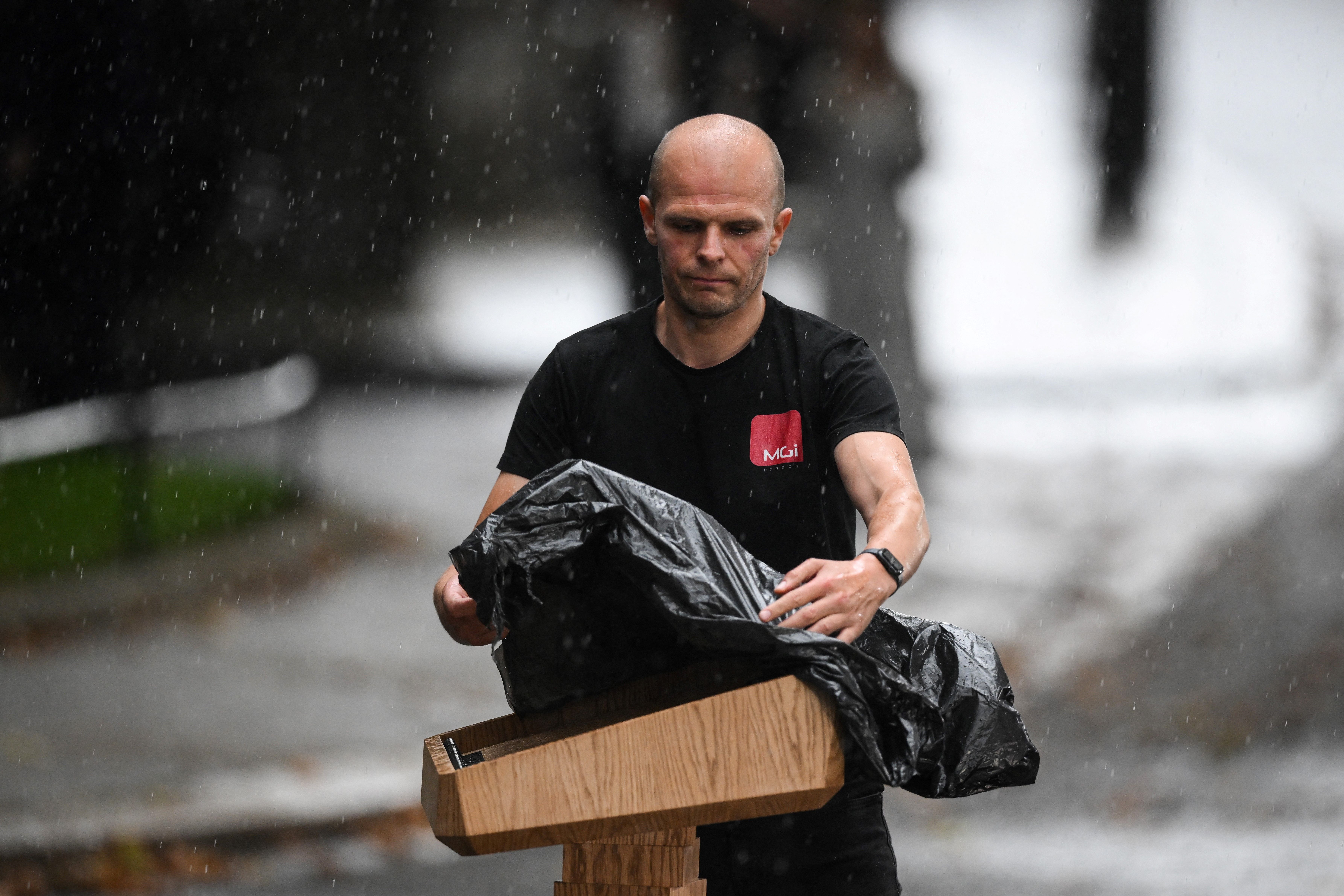
The UK, being swept up instead in this most recent episode in the never-ending saga of Tory self-indulgence, was not able to announce any plans, because it did not, in effect, have a government. As a result, the country’s inflation forecasts put those of their rivals to shame, and the UK’s credit rating was officially downgraded, with predictably damaging consequences for business. Truss, meanwhile, spent the time insisting that “handouts” were not the answer, in keeping with her new-found free-market-based ideological certainty.
Three days later, however, her new chancellor, Kwasi Kwarteng, was on his feet in the House of Commons, announcing a £100bn handout on energy bills, when the place went aquiver. Notes were passed about on the front benches. Angela Rayner blanched and rushed out. Elsewhere, Huw Edwards was rushed from his South London hairdresser’s and told to prepare to announce the death of the Queen.
Later that day, Truss gave a short and entirely unmemorable statement outside 10 Downing Street. When she gave another – her last –barely six weeks later, the only two achievements she was able to draw upon were the success of the Queen’s funeral – in which she had played no part whatsoever – and her brave intervention on energy bills, to which she herself had been opposed.
We now know that the secret undercurrent to those fully deranged weeks was a prime minister who, by her own admission, did not have a clue what she was doing. The period of national mourning, with the suspension of politics and of life as we knew it, should have provided a brilliant opportunity to get things working as she wanted them to, and to prepare for her much anticipated “mini-Budget”. Instead, she sacked the senior civil servant at the Treasury, Tom Scholar.
It is widely believed that Scholar was dispensed with for having the temerity to suggest that what Truss wanted to do was demonstrably insane, but according to several people with intimate knowledge of what happened, that is not the case. Scholar was done away with over petty historical grievances from Truss’s time as chief secretary to the Treasury, when his assessment of her extremely limited abilities was not kept entirely secret from her.
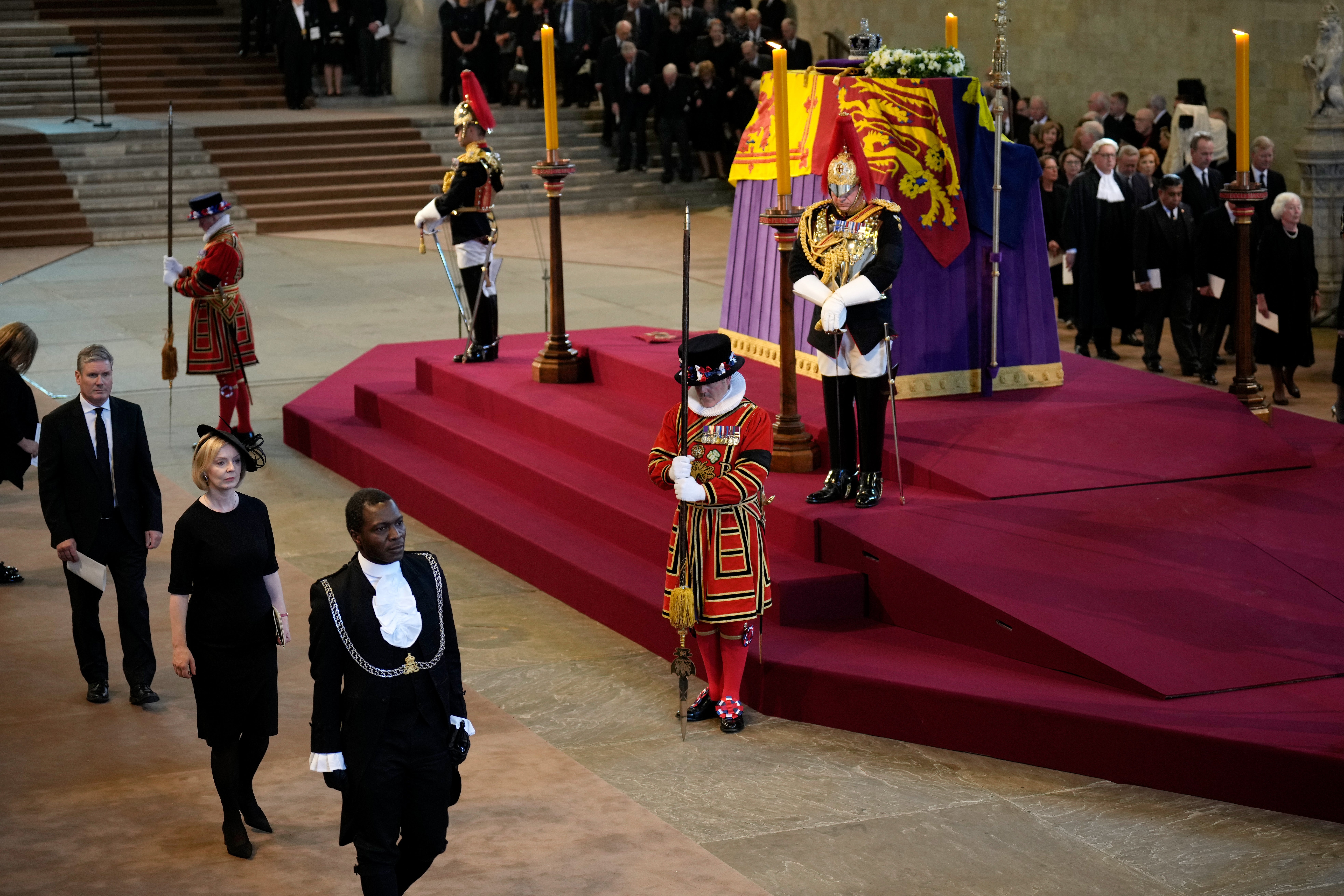
And besides, she did not need a man of Scholar’s knowledge and experience to point out why her “mini-Budget” was likely to go so badly wrong. Almost anyone would have done. She just had to listen. Listen, for example, to Rishi Sunak, who had stood next to her for six weeks at about 40 different debates and hustings events, telling her that her plans would cause inflation and a recession. But she didn’t, and neither did her party.
You need only listen to someone with barely a GCSE in economics to know that there is almost no good time to announce £45bn of unfunded tax cuts that can only be paid for by more borrowing. But the very worst time would be when you have also just announced that another £100bn will be spent on paying people’s energy bills for them. Some of that money really did go on heating Sunak’s swimming pool.
The Tories certainly didn’t see what was coming. Chris Philp, the chief secretary to the Treasury and best understood as a kind of Matt Hancock 2.0 but without any of the charm or likeability, gleefully tweeted at the start of the statement that it was “Great to see sterling strengthen on the back of the new UK Growth Plan”. Within about an hour, the pound had fallen to a 37-year low against the dollar. Arguably to the man’s credit, the tweet has not been deleted.
In her first interview after leaving office, Truss blamed officials for not having explained to her how exposed UK pension funds were to rising government bond yields. That it was, in other words, somebody else’s fault that the Bank of England had to intervene to protect people’s pensions from their own government.
The Bank’s emergency intervention spooked the markets even further. Mortgage lenders jacked up rates. Kwarteng tried to explain that rates were rising all over the world, that it wasn’t just confined to Britain. But his analysis was incorrect. Lenders were moving faster than the Bank of England, a situation that resulted in anyone who had to renew their fixed-rate mortgage at this most unfortunate time having to pay what correctly became known as the “Tory moron premium”. Thousands of people are still paying it now, and will be for years to come.
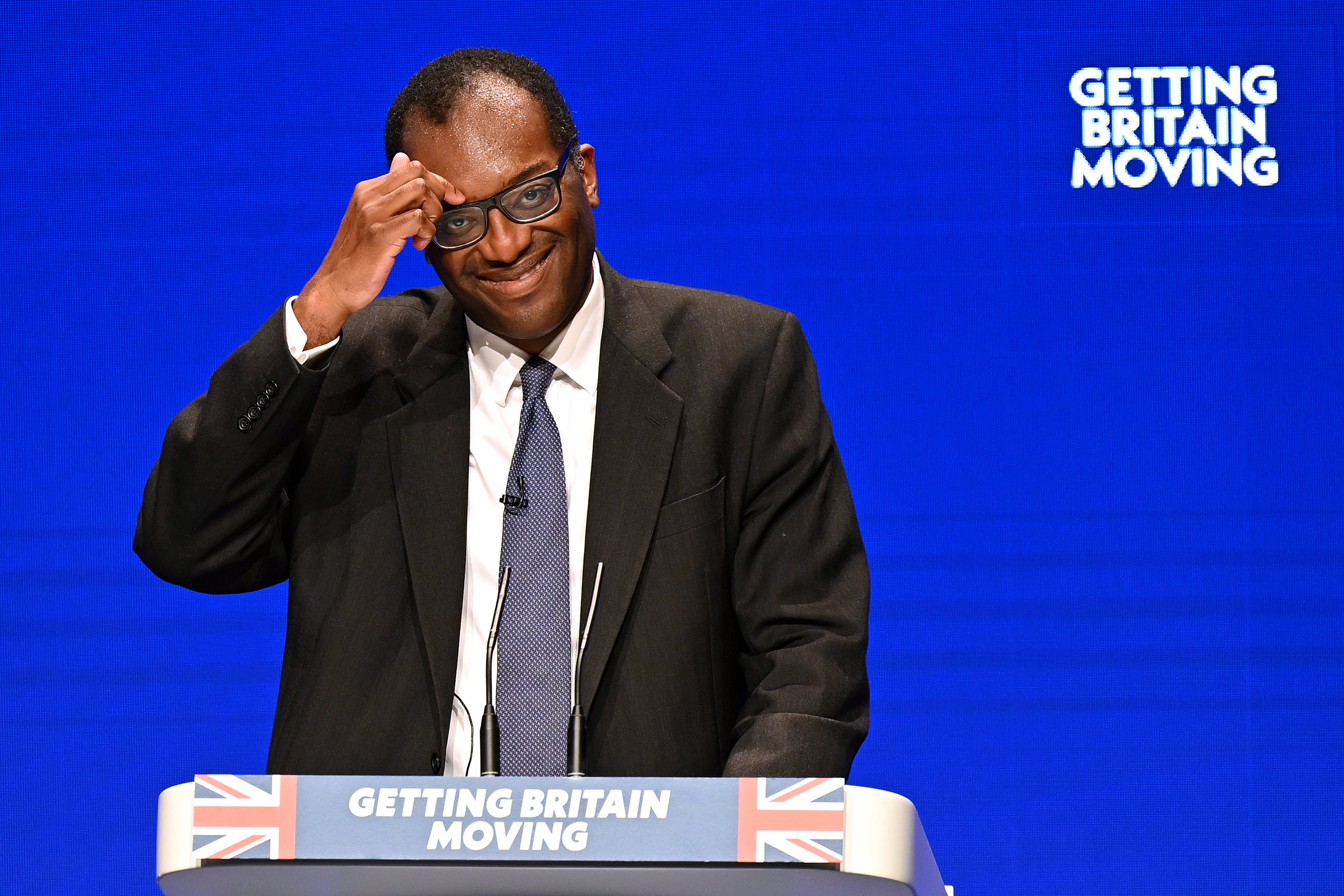
It is hard to recover from that sort of disgrace. Truss never did. Sacking her chancellor got her through a few more days. It might have got her through a few more, had she not taken every opportunity she could to explain that the two of them had agreed on everything, that it was her fault just as much as his. That, in other words, she had sacked him for no reason beyond needing a bit of a vibe shift.
It is regularly remarked upon that the general quality of politicians and public servants seems to have plummeted in recent times, and Kwarteng’s cameo on that front is worth remembering. Here is a man who won a scholarship to Eton, won prizes for translating Greek poetry, has several degrees from Cambridge and Harvard, and has written impressive works of history. He will be remembered as quite possibly the worst public servant the public has ever known. Inflicting that sort of pain on real people, for no real reason, in such a staggeringly short space of time, has surely never been done before, nor will it again.
Budgets, mini or otherwise, have to be approved by the House of Commons, and they are a de facto confidence vote. If you can’t pass a Budget, you can’t, for example, borrow the money you need in order to run the country. Truss had inherited Johnson’s 80-seat majority, albeit whittled down to more like 70 for a smorgasbord of reasons, as one Tory MP after another was exposed for dubious behaviour. Transgressions included engaging in overtly corrupt lobbying activities (Owen Paterson), watching tractor porn in the House of Commons (Neil Parish), eating camel penis for money (Hancock), and being convicted of the sexual assault of a child (Imran Ahmad Khan). But even that majority was not going to be big enough. Her biggest, most audacious tax cut – the abolition of the 45p rate – was itself abolished.
It is, looking back, remarkable to consider that things actually got worse from here. Sacking Kwarteng for nothing was a high point compared with what came next. On 17 October, his replacement, Jeremy Hunt, took the unprecedented step of calling the TV cameras into his office in the Treasury to give a live address about how things were going to be different from now on. Such speeches are usually given in presidential palaces, by men in combat fatigues who tell you there’s definitely no need to worry.
This was a very British coup. Charterhouse in, Eton out (Winchester would, it turned out, be along shortly). And one by one, everything Truss had made a very public show of defiantly believing in was being undone. There would be no more unfunded tax cuts: instead there would be tax rises. There would be a need, in other words, to pay for the damage that had just been done.
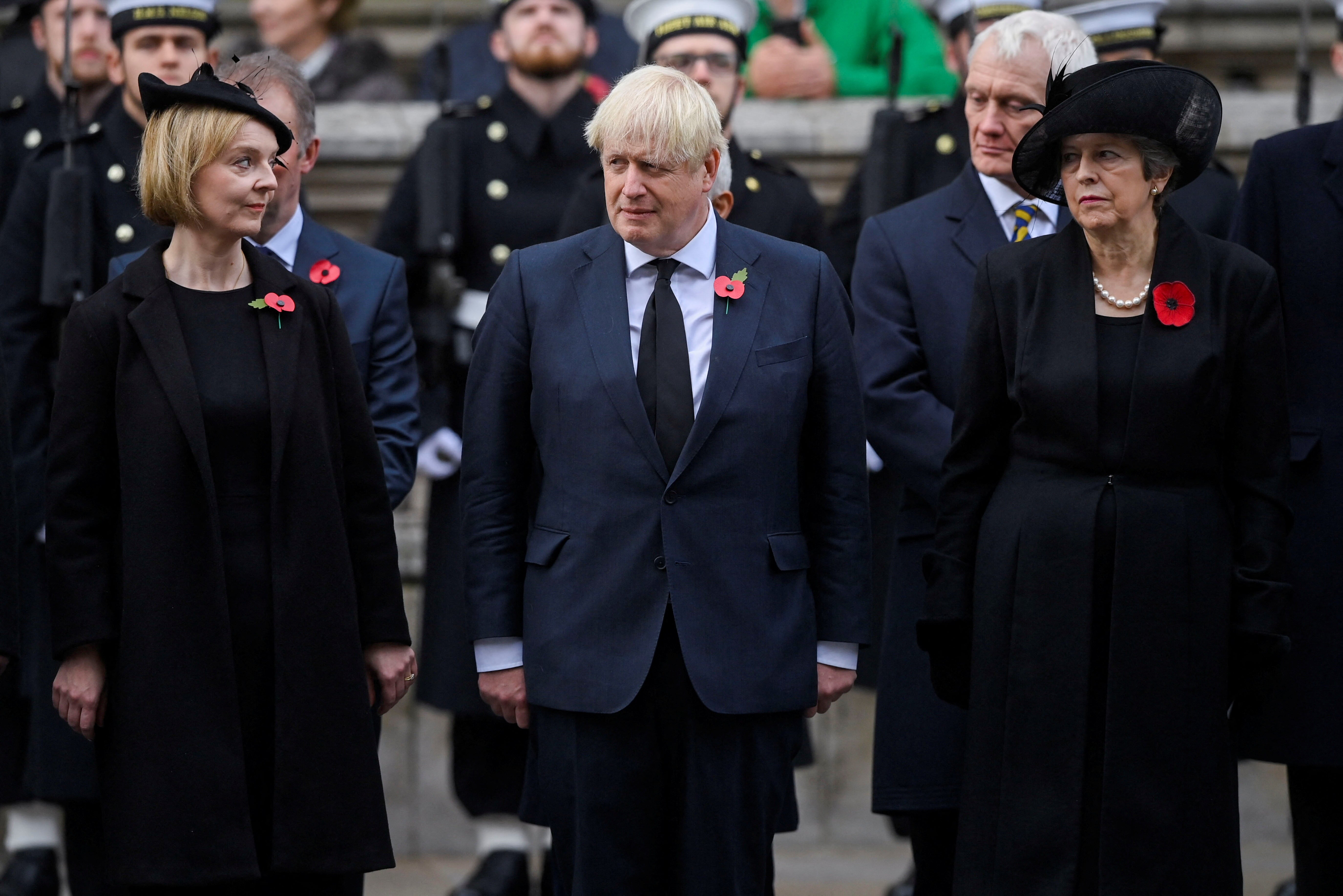
Historians of a lesser calibre than Hunt’s predecessor will probably come to conclude that the game was up by this point. But those who lived through it may recall it slightly differently. By the time of the Treasury palace coup, the Liz Truss lettuce webcam had already been running for 72 hours and counting. The Daily Star’s bold countdown of who would be the first to go, Truss or a slowly rotting lettuce, had already achieved international notoriety. As Hunt calmly but boldly reasserted reality over insanity, a blonde wig was added to the lettuce, just to liven things up a bit. Eventually it was joined by fake feet, fake hands, a pair of glasses, various stuffed toys, and a “Keep Calm and Carry On” mug.
The lettuce won. Truss announced her resignation. The people over at the Daily Star piped in the national anthem, and prime minister Truss was off to Buckingham Palace, as the first prime minister to offer her resignation to King Charles III.
Most depressingly of all, but entirely predictably, Truss has given no public sign of having learnt anything at all from her experiences, or from the pain she inflicted on others. The free-market libertarians from the Institute of Economic Affairs, the hardest of hard-Brexit commentators, were sent apoplectic with delight at everything she and Kwarteng did, and the staggering failure of those actions has done precisely nothing to dampen the certainty of their entirely wrong convictions.
Truss wasted no time at all in heading off to Washington DC to give a speech to a very right-wing think tank, expounding the same ideas that had ruined normal people’s lives and rendered her a joke that will be laughed at for the rest of her days.
There have, in the past year, been many state occasions that it is customary for all living prime ministers to attend, not least the King’s coronation. It is feasible that, at some point, Truss will have spent more Remembrance Sundays at the Cenotaph than days in 10 Downing Street. She will, for ever more, be the perpetual mood-lightener. The Tory party has no hope of ever governing again unless it finds a way to put a lid back on its own insanity. But Truss will always be there, wearing as sombre a face as she can manage and reminding everyone exactly what the Conservatives are capable of if you take your eye off them for a second.
Join our commenting forum
Join thought-provoking conversations, follow other Independent readers and see their replies
Comments
Bookmark popover
Removed from bookmarks